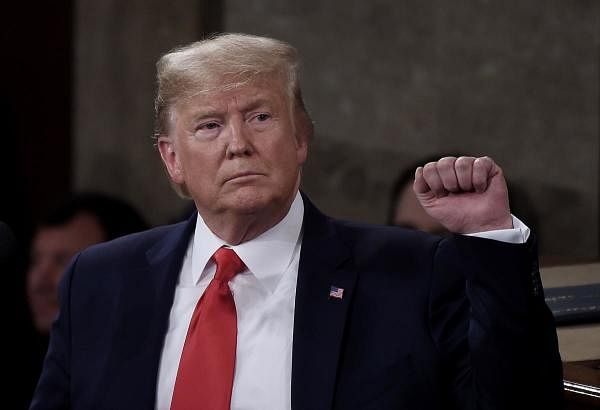
In a huge blow to Indian IT professionals eyeing the US job market, the Trump administration has suspended the most sought-after H-1B visas along with other types of foreign work visas until the end of 2020 to protect American workers in a crucial election year.
Under a proclamation signed by President Donald Trump on Monday, the new restrictions will take effect on June 24.
The decision will impact a large number of Indian IT professionals and several American and Indian companies who were issued H-1B visas by the US government for the fiscal year 2021 beginning October 1.
Also read: Sundar Pichai disappointed by Trump's immigration plan
They would now have to wait at least till the end of the current calendar year before approaching the US diplomatic missions to get stamping. It would also impact a large number of Indian IT professionals who are seeking renewal of their H-1B visas.
The H-1B visa is a non-immigrant visa that allows US companies to employ foreign workers in specialty occupations that require theoretical or technical expertise. The technology companies depend on it to hire tens of thousands of employees each year from countries like India and China.
In April, Trump signed an immigration proclamation targeting people outside of the US seeking to legally migrate to the US, with some exceptions. That order, which was set to lapse, will be extended until the end of 2020 and expanded to include some guest worker visas.
The new visas included are L-1 visas for intracompany transfers, H-1Bs for workers in specialty occupations as well as the H-4 visa for spouses, H-2Bs for temporary non-agricultural workers and most J-1 visas for exchange visitors.
The new rules would apply only to those who are outside the US, do not have a valid non-immigrant visa and an official travel document other than a visa to enter the country.
Trump, seeking another term in the White House in the November 3 presidential election, said the step was essential to help millions of Americans who have lost their jobs due to the economic crisis amidst the COVID-19 pandemic.
While issuing the proclamation, Trump has ignored the mounting opposition to his order by various business organisations, lawmakers and human rights bodies.
Google CEO Sunder Pichai expressed disappointment over Trump's decision.
“Immigration has contributed immensely to America's economic success, making it a global leader in tech, and also Google the company it is today,” Indian-American Pichai said in a tweet.
“Disappointed by today's proclamation - we'll continue to stand with immigrants and work to expand opportunity for all,” he said.
Vanita Gupta, president and CEO the Leadership Conference on Civil and Human Rights, slammed the move of the Trump administration.
“The latest travel ban is a new season of the same racist, xenophobic show put on by Donald Trump and Stephen Miller,” she said.
While defending his move, President Trump said, "We must remain mindful of the impact of foreign workers on the United States labour market, particularly in the current extraordinary environment of high domestic unemployment and depressed demand for labour."
Trump said that the overall unemployment rate in the country nearly quadrupled between February and May of 2020 -- producing some of the most extreme unemployment rates ever recorded by the Bureau of Labor Statistics.
While the rate of 13.3 per cent unemployment in May reflects a marked decline from April, millions of Americans remain out of work.
The proclamation also extends till the end of the year his previous executive order that had banned issuing of new green cards of lawful permanent residency.
Green Card holders, once admitted pursuant to immigrant visas, are granted "open-market" employment authorisation documents, allowing them immediate eligibility to compete for almost any job, in any sector of the economy, he said.
“American workers compete against foreign nationals for jobs in every sector of our economy, including against millions of aliens who enter the United States to perform temporary work. Temporary workers are often accompanied by their spouses and children, many of whom also compete against American workers,” Trump said.
“Under ordinary circumstances, properly administered temporary worker programmes can provide benefits to the economy. But under the extraordinary circumstances of the economic contraction resulting from the COVID-19 outbreak, certain non-immigrant visa programmes authorising such employment pose an unusual threat to the employment of American workers,” he said.
For example, Trump said, between February and April of 2020, more than 17 million jobs were lost in industries in which employers are seeking to fill worker positions tied to H-2B nonimmigrant visas.
“During this same period, more than 20 million United States workers lost their jobs in key industries where employers are currently requesting H-1B and L workers to fill positions.
“The entry of additional workers through the H-1B, H-2B, J, and L non-immigrant visa programmes, therefore, presents a significant threat to employment opportunities for Americans affected by the extraordinary economic disruptions caused by the COVID-19 outbreak,” Trump said.
According to the proclamation, it does not have an impact on lawful permanent residents of the United States and foreign nationals who are spouses or child of an American citizen.
Foreign nationals seeking to enter the US to provide temporary labour or services essential to the food supply chain are also exempted from the latest proclamation.